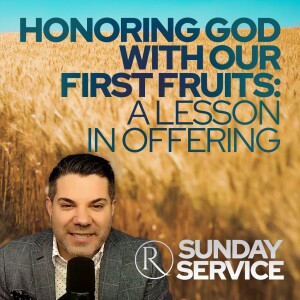
Todd Coconato Show — Remnant News
Religion & Spirituality:Christianity

Honoring God with Our First Fruits: A Lesson in Offering • Sunday Service
To Give: www.ToddCoconato.com/give
New Book: www.PastorToddBook.com
Website: www.PastorTodd.org
Church website: www.RRCNashville.org
First Fruits was a Jewish feast held in the early spring at the beginning of the grain harvest. It was observed on Nissan 16, which was the third day after Passover and the second day of the Feast of Unleavened Bread. Firstfruits was a time of thanksgiving for God’s provision.
Leviticus 23:9-14 institutes the firstfruits offering. The people were to bring a sheaf of grain to the priest, who would wave it before the Lord. A burnt offering, a meal offering, and a drink offering were also required at that time. Deuteronomy 26:1-10 gives even more detail on the procedure of firstfruits.
No grain was to be harvested at all until the firstfruits offering was brought to the Lord (Leviticus 23:14). The offering was made in remembrance of Israel’s sojourn in Egypt, the Lord’s deliverance from slavery, and their possession of “a land that floweth with milk and honey.” The day of the firstfruits offering was also used to calculate the proper time of the Feast of Weeks (Leviticus 23:15-16).
I. Understanding the Concept of First Fruits
Proverbs 3:9-10 (NKJV):
"Honor the Lord with your possessions, And with the first fruits of all your increase; So your barns will be filled with plenty, And your vats will overflow with new wine."
II. The Significance of Giving First Fruits
Exodus 23:19 (NKJV):
"The first of the first fruits of your land you shall bring into the house of the Lord your God..."
III. The Story of Cain and Abel
Genesis 4:2-5 (NKJV):
"Then she bore again, this time his brother Abel. Now Abel was a keeper of sheep, but Cain was a tiller of the ground. And in the process of time it came to pass that Cain brought an offering of the fruit of the ground to the Lord. Abel also brought of the firstborn of his flock and of their fat. And the Lord respected Abel and his offering, but He did not respect Cain and his offering. And Cain was very angry, and his countenance fell."
IV. The Story of Ananias and Sapphira
In the New Testament, the firstfruits offering is mentioned seven times, always symbolically. Paul calls Epaenetus and the household of Stephanas “the firstfruits of Achaia” (Romans 16:5; 1 Corinthians 16:15). His meaning is that, just as the firstfruits offering was the first portion of a larger harvest, these individuals were the first of many converts in that region. James calls believers “a kind of firstfruits of His creatures” (James 1:18). Just like the sheaf of grain was set apart for the Lord, so are believers set apart for God’s glory.
The firstfruits offering found its fulfillment in Jesus. “But Christ has indeed been raised from the dead, the firstfruits of those who have fallen asleep” (1 Corinthians 15:20). Jesus’ resurrection has paved the way for our resurrection. Significantly, if Jesus was killed at Passover, then His resurrection on the third day would have fallen on Nissan 16—the Feast of Firstfruits.
Acts 5:1-5 (NKJV):
"But a certain man named Ananias, with Sapphira his wife, sold a possession. And he kept back part of the proceeds, his wife also being aware of it, and brought a certain part and laid it at the apostles’ feet. But Peter said, 'Ananias, why has Satan filled your heart to lie to the Holy Spirit and keep back part of the price of the land for yourself? While it remained, was it not your own? And after it was sold, was it not in your own control? Why have you conceived this thing in your heart? You have not lied to men but to God.' Then Ananias, hearing these words, fell down and breathed his last. So great fear came upon all those who heard these things."
V. Blessings in Giving First Fruits
Malachi 3:10 (NKJV):
"Bring all the tithes into the storehouse, That there may be food in My house, And try Me now in this,” Says the Lord of hosts, “If I will not open for you the windows of heaven And pour out for you such blessing That there will not be room enough to receive it."
The first fruits offering is never directly applied to Christian giving in the New Testament. However, Paul taught the Corinthian believers to set aside a collection “on the first day of the week” (1 Corinthians 16:2). And, just as the offering of firstfruits was an occasion of thanksgiving, so the Christian is to give with gladness.
In summary, firstfruits symbolizes God’s harvest of souls, it illustrates giving to God from a grateful heart, and it sets a pattern of giving back to Him the first (and the best) of what He has given us. Not being under the Old Testament Law, the Christian is under no further obligation than to give cheerfully and liberally (2 Corinthians 9:6-7).
More Episodes
 2024-11-03
2024-11-03
 2024-11-03
2024-11-03
 2024-10-28
2024-10-28
 2024-10-22
2024-10-22
 2024-10-22
2024-10-22
Create your
podcast in
minutes
- Full-featured podcast site
- Unlimited storage and bandwidth
- Comprehensive podcast stats
- Distribute to Apple Podcasts, Spotify, and more
- Make money with your podcast
It is Free
- Privacy Policy
- Cookie Policy
- Terms of Use
- Consent Preferences
- Copyright © 2015-2024 Podbean.com





